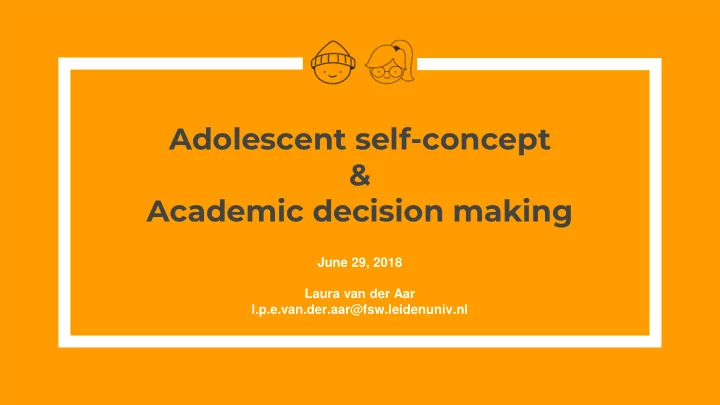

Adolescent self-concept & Academic decision making June 29, 2018 Laura van der Aar l.p.e.van.der.aar@fsw.leidenuniv.nl
Definitions She gets good grades in school Self-Concept Curly hair How you think about yourself Social construct Self-descriptions Red dress Evaluative in nature Differ in importance given to them Can be categorized in domains She is Self-esteem curious Overall evaluation of your worth as a person She is impulsive
Important?
Defining Adolescence 5 10 15 20 25 Puberty Adolescence Hormonal changes Culturally dependent
Self in Adolescence
Brain development Child Adolescent Adults
How to study self-concept?
Self-concept Study Timepoints Participants Age 3 timepoints 160 at T1 11-21 at T1 2 waves completed. ± 15 per age Presenting data wave 1 Gender Pubertal Status Estimated IQ 86 female 5-20 80-137.5 74 male M females = 15.3 M = 109.9 M males = 14.3
Self-concept Study Direct Control Task o 60 trials o 3 domains (physical, academic, prosocial) o Positive / Negative
Monit nitor or Mirro ror Butto tonb nbox ox
Results Domains and Development
Behaviour Most positive about: o Prosocial traits Least positive about: o Academic traits
Behaviour Development o Only for academic traits o Less positive in mid-adolescence
Neural Domain-general o mPFC
Neural Striatum o Self-relevance/relatedness, intrinsic/reward value, salience o Dip in self-evaluation?
SUMMERY ⊡ Self-concept becomes more differentiated upon domain ⊡ Possible dip in positive self-evaluation in mid adolescence ⊡ mPFC plays an important role in self-concept development in adolescence ⊡ Longitudinal research is needed to better understand these relations
Self-concept related to study choice What characterizes adolescents who have difficulties with making academic choices?
Source: NRC, jan 2018
30 to 35 % Drops out in their first year of college Source: Vereniging Hogescholen/VSNU
Why do so many students drop out of college? Wrong match between person and study Wrong choice The adolescent brain… ….Choices
External orientation Internal orientation
Behavioral and neural correlates of: Self-esteem Self-knowledge
“ What characterizes adolescents who have problems with making academic choices?
10 month structured gap-year program Focuses on increasing self-knowledge and self-esteem Participants will be able to make a better suited academic choices for the future
2 to 3 days of training and workshops per week Personal coach Multiple categories of learning: Learn about own traits and competences Awareness and change of own behaviour Improving social skills Decision making Vitality Society
Adolescents between 16 and 24 years Gap year between high school and higher education, or drop outs Experience difficulties in choosing study / career path A lot of diversity Level of educational tracks Background variables Groups in Amsterdam, Utrecht and Eindhoven Around 30 adolescents per group
BREEKJAAR CONTROL N = 38 N = 46 Gender: Gender: 14 Male 24 Female 22 Male 24 Female Age: Age: 16 – 24 years; M = 18,7 17 – 21 years; M = 19,4 IQ: IQ: 85 – 127.5; M = 104,5 85 – 132,5; M = 109,1 Educational background: Educational background: □ □ □ High school: 22 All in higher education Tried higher education: 16
SELF-DESCRIPTIONS IN MRI IMPORTANCE To what extent individuals describe The value one could certain traits in a diverse set of place upon possessing domains to be applicable to them certain traits SELF-CONCEPT CLARITY SELF-ESTEEM The extent to which General overall individuals describe their evaluation of the self self-concept as clear, stable, and internally consistent
Self-descriptions Importance 4 * 3,5 3,5 3 3 2,5 2,5 2 2 Academic Physical Prosocial Academic Physical Prosocial Breekjaar Control Breekjaar Control Self-concept clarity Self-esteem *** 4 *** 4 3 3 2 2 1 1 Breekjaar Control Breekjaar Control
Self > Control 6 4 Medial PFC Activity 2 0 0 1 2 3 4 5 -2 -4 Breekjaar Controle -6 Self-Esteem
CONCLUSION Positive academic self-evaluations & Healthy levels of self-esteem could be important conditions for the ability to make future-oriented academic choices.
DISCUSSION ⊡ Focus on self-concept in schools ⊡ How to improve this?
Thank you! Thanks to: Brain and Development Research Center Stichting Breekjaar Financial support: Netherlands – NWO
Recommend
More recommend